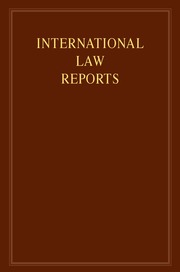No CrossRef data available.
Article contents
Ireland v. United Kingdom (Irish case)
Published online by Cambridge University Press: 01 January 2021
Abstract
The individual in international law — Human rights and freedoms — European Convention for Protection of — Application brought by one Contracting State against another under Article 24 — Failure of Respondent State fully to afford desirable assistance to the Commission — Article 28 (duty of Contracting States to cooperate with Convention institutions)
Article 3 (prohibition against torture or inhuman or degrading treatment or punishment) — Article 3 — Uncontested allegations of breach — Question whether an adjudication would be devoid of purpose — Role of Court in elucidating, safeguarding and developing the rules instituted by the Convention — Question of Court's jurisdiction to deal with individual cases in view of Commission's concern with an “administrative practice” — Commission's admissibility decision traces the framework for a case subsequently brought before Court — Definition of an “administrative practice” — Strict liability under the Convention of higher State authorities for actions of subordinates — Importance of concept of a practice in the context of the domestic remedies rule which applies equally to State and individual applications — Location of burden of proof — Standard of proof — Proof “beyond reasonable doubt” — Place of inferences, presumptions of fact and conduct of Parties in applying this standard — Minimum level of severity for treatment to fall within Article 3 — Relativity of such a level depending on all the circumstances of the case — Victim's conduct irrelevant in applying this standard — Evaluation of “the five techniques” — Whether reaching the particular intensity and cruelty implied by the term “torture”, whether “inhuman treatment” — Other alleged practices — Practices of physical ill-treatment which are discreditable and reprehensible but not in breach of Article 3
Request for a consequential order from the Court — Sanctions available to Court do not include power to direct a Contracting State to institute criminal or disciplinary proceedings
Article 5 (prohibition against arbitrary deprivation of liberty and protection of various ancillary rights) — List of cases in Article 5(1) in which it is permissible to deprive someone of his liberty is exhaustive — Various deprivations of liberty alleged unjustifiable under Article 5(1) — Failure to provide reasons for arrest — Breach of Article 5(2) — Impugned measures not effected for the purpose of bringing the persons concerned promptly before the competent legal authority — Breach of Article 5(3) — No entitlement to take proceedings by which the lawfulness of detentions would be decided speedily by a court — Breach of Article 5(4) — Habeas corpus in this context — Judicial review powers insufficiently wide in scope to satisfy Article 5(4)
Article 5 taken together with Article 15 (right of derogation in time of war or other public emergency) — Conditions under which Article 15 comes into play — Role of the Court in applying these criteria — Wide margin of appreciation afforded to national authorities in Article 15 determinations — Margin accompanied by international supervision — Evidentiary questions — Court's complete freedom in assessing admissibility, relevance, and probative value — Factors reducing weight of certain evidence — Factors establishing that Respondent was reasonably entitled to consider that normal legislation offered insufficient resources for campaign against terrorism — Arrest of persons for sole purpose of obtaining information from them about others — Fact that measures were used principally or exclusively against one group of terrorists and not against another in context of Article 15 — Whether such restriction of scope incompatible with the standard of being “strictly required” — Whether tendency towards a liberalisation of domestic enactments meaning that initial measures were not “strictly required” — Article 15 must leave a place for progressive adaptations
Article 5 taken together with Article 14 (prohibiting discrimination in the enjoyment of the protected rights and freedoms) — Difference in treatment between two groups of terrorists — Question of objective and reasonable justification in this regard — Existence of profound differences between the two sources of terrorist activity — Court unable to affirm, on evidence before it in view of margin of appreciation, that there was any violation of Article 14 in conjunction with Article 5
Article 6 (the principle of a fair trial) — Unnecessary to decide the matter — Assuming Article 6's materiality, derogations therefrom justifiable under Article 15 — Similarly, no discrimination contrary to Article 14 in the context of Article 6
Article 1 (duty to secure the rights and freedoms set out in the Convention) — Meaning and significance of Article 1 in the framework of the Convention — In order to secure the enjoyment of the rights and freedoms there set forth national authorities must prevent or remedy any breach at subordinate levels — Question whether a Contracting State is entitled to challenge a law in abstracto — Such a breach may be found only if it is immediately apparent — No such breaches existent in context of Articles 3, 5, 6 and 15, taken together with Articles 1 and 14
Keywords
- Type
- Case Report
- Information
- Copyright
- © Cambridge University Press 1980


